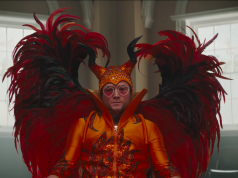“The Producers” is a movie based on a play that was based on a movie ABOUT a play. But don’t worry: Mel Brooks wrote it, so you know it’s not going to be TOO thinky.
Brooks’ 1968 film about a schlocky Broadway producer who sets out to stage the worst play he can find was Brooks’ first feature and still one of his best. It wasn’t a musical, but it featured one legendary song: “Springtime for Hitler,” the title number from the pro-Fuhrer play that the producer believes fits the bill as “worst ever.”
From there, Brooks expanded his story into the full-fledged 2001 Broadway musical that starred Nathan Lane and Matthew Broderick and earned a record 12 Tony Awards. Now director Susan Stroman recreates her stage version for the big screen, retaining most (but not all) of the comedic mayhem that slew thousands of theatergoers. (I was lucky enough to be in New York just after the show opened, and to have bought a ticket months earlier, when you could still get one. It was worth whatever outrageous amount of money I paid for it.)
Lane plays Max Bialystock, a down-on-his luck producer whose “Funny Boy” (a musical version of “Hamlet”) has just closed after one performance. One performance is about his average lately; the audience and critical reactions are usually savage enough to prevent any further exhibitions of his theatrical mediocrities. Yet he remains afloat by wooing little old ladies and getting them to back his plays, since they’re old and wealthy and lonely enough not to care if their investments are ever returned. To make matters easy when it comes to writing out checks, he tells them the show is called “Cash.”
Leo Bloom (Broderick) is the mousy accountant assigned to go over Max’s books, and while thinking aloud, he notices something: If you don’t mind breaking the law, you could make more money with a flop than with a hit. Say the show will cost $100,000 to mount. Simply collect far more than that — say, $2 million — from investors, promising them each, I don’t know, 50 percent of the returns. If the show bombs, there are no returns, and thus no need to pay anyone back, and you pocket the $1.9 million difference (and flee to Rio, of course). Now, if the show is a hit, then you have to pay back several thousand percent to a lot of angry backers, and you go to jail for fraud.
But if anyone can stage a flop, it’s Max Bialystock. Playing on Leo’s lifelong affection for the theater, he convinces him to help pull the con, which of course will require a play that is BOUND to fail. The play they choose is a musical called “Springtime for Hitler,” written by an affirmed pigeon-raising Nazi named Franz Liebkind (Will Ferrell), who is thrilled that someone wants to produce his love letter to Der Fuhrer. Since he’s so at-one with Hitler, in fact, he’s cast to play him.
What else do you need? A bad director, of course. Max and Leo locate Roger De Bris (Gary Beach), a flamboyant purveyor of fluffy mass entertainment who is aided, in matters theatrical and personal, by his “common law assistant” Carmen Ghia (Roger Bart). Roger’s philosophy is that audiences don’t want anything serious: “Keep it light, keep it bright, keep it gay,” he sings, in a song full of that broad Brooksian double-entendre and gleeful political incorrectness.
The big joke of “The Producers” is that “Springtime for Hitler,” despite all efforts to the contrary, is a huge hit. Audiences see it as an ironic spoof of Nazism, not as the celebration of it that Franz Liebkind intended. This element of the film is even more relevant now, in the Age of Irony, than it was in 1968. At that time, the audience in the film taking “Springtime for Hitler” as a parody was a crazy, unforeseeable outcome. Today, we see things ironically all the time. (Just this year, Showtime aired a remake of the old film “Reefer Madness,” no longer a cautionary tale against marijuana but a SPOOF of cautionary tales against marijuana.)
Stroman, in her debut as a film director, captures most of the frenetic energy of the stage show. It’s impossible to do it exactly, of course, especially when so much of the performance depends on playing off the audience. But the fact that Lane and Broderick worked opposite each other for several hundred performances is evident. They operate like a finely crafted old-time comedy duo, perfectly in tune with each other and both intently focused on being not just funny, but funny in a big, madcap way.
Lane is the standout, just as he was on Broadway. He embodies Max with a mad, farcical zeal. It was dazzling to contemplate how much energy he expended onstage. Even knowing the film was shot over the course of weeks, it’s still exhausting to watch him as he launches from song to song and joke to joke like a chubby little laugh-seeking missile. His mid-show song “Betrayed” — in which he summarizes the entire show thus far in one crazed musical number — is a showstopper.
Their praises are not as widely sung, but Gary Beach and Roger Bart as Roger and Carmen must be cited for their hysterical performances as well. They’re also from the Broadway cast, and their scenes together are just as rife with comic genius as Broderick and Lane’s, every inflection and every movement just as silly and goofy as you please. (It’s not a spoiler to mention that Roger De Bris winds up playing Hitler onstage, and his big number — “Heil Myself” — is a Liza-inspired tour-de-force of parody and physical comedy.)
Ferrell acquits himself well enough as Franz, and Uma Thurman does a surprisingly good job as Ulla, Max and Leo’s buxom Swedish receptionist. In fact, Stroman directs the entire cast to a uniform style of over-the-top, setup/punchline acting that benefits the material immensely. Like most good movie musicals, there is no attempt to make it seem “real.” Such an effort would be useless, because no scene that involves people spontaneous breaking into song is ever going to be “real.” Instead, Stroman’s cast uses a stylized delivery — not “realistic,” exactly, but believable within its own bizarre world. You don’t believe a regular person would ever say or do this stuff, but you believe that characters in a musical would, and more specifically that THESE characters would.
The text of the film (written by Brooks and Thomas Meehan from their Broadway script) offers no clues about when it is set. But Stroman has done a very wise thing, which is to give it the look and feel of the mid-60s. Not only does that match the time period of the original film — and Stroman even stages some of the comedy to resemble the way Zero Mostel and Gene Wilder played it in ’68 — but it’s also when movie musicals were far more common than they are today. Watching “The Producers,” then, is not as jarring as watching musicals can sometimes be (though it does take a few minutes to warm up before it really kicks into high gear). Stroman’s vision favors long takes, is filmed with vibrant colors, and features costumes, sets and music reminiscent of the old-style widescreen Technicolor musicals.
The humor is large, loud and fast-paced, rarely subtle. Watching it is like watching an old movie — a raucous, randy, delightful old movie.
B+ (2 hrs., 14 min.; )





